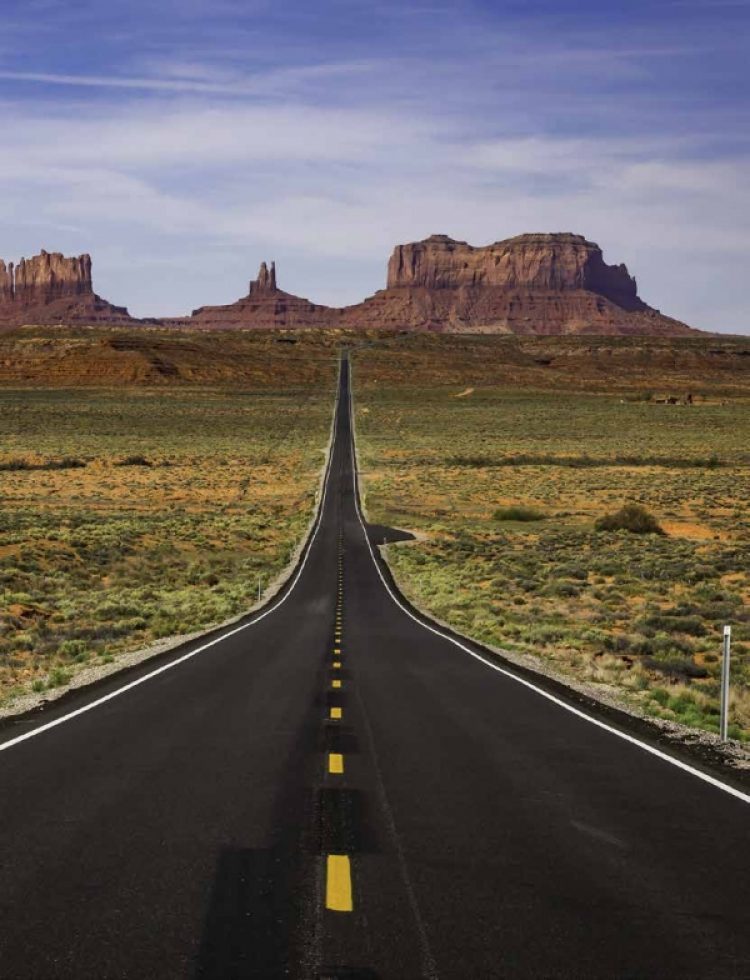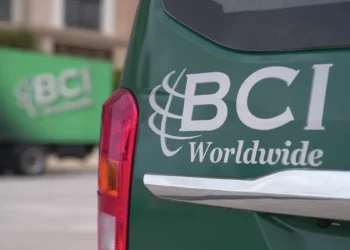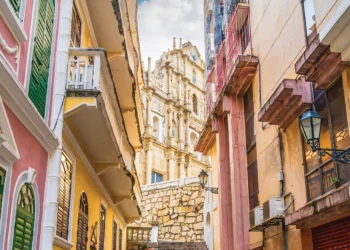Mohegan Gaming and Entertainment CEO Mario Kontomerkos believes the Native American casino operator has two aces in the hole for Japan, especially when it comes to the so-called regional markets beyond major areas.
In his presentation at last month’s Japan Gaming Congress, Kontomerkos emphasized that Japan’s regional markets resemble the remote location of MGE’s flagship Mohegan Sun integrated resort. In that rural Connecticut setting, albeit just over two hours from New York City and 90 minutes from Boston on the US east coast, MGE has created the highest-grossing casino in North America with annual net revenue exceeding US$1 billion. The IR features 1,600 hotel rooms, the 10,000 seat Mohegan Sun Arena hosting top entertainers and shows plus two MGE owned sports franchises, smaller stages, a golf course, more than 300 gaming tables, nearly 5,000 gaming machines, and dozens of dining and shopping options.
“We rely on the local market to provide employees for the venue, not as customers,” Kontomerkos declared. Mohegan Sun attracts 11 million people a year, including one-third of all foreign visitors to Connecticut.
Its one rival in Connecticut is Foxwoods, with revenue of around US$850 million a year at its own remote property which includes more than 2,000 hotel rooms, 250 gaming tables and 5,500 gaming machines across six casinos.
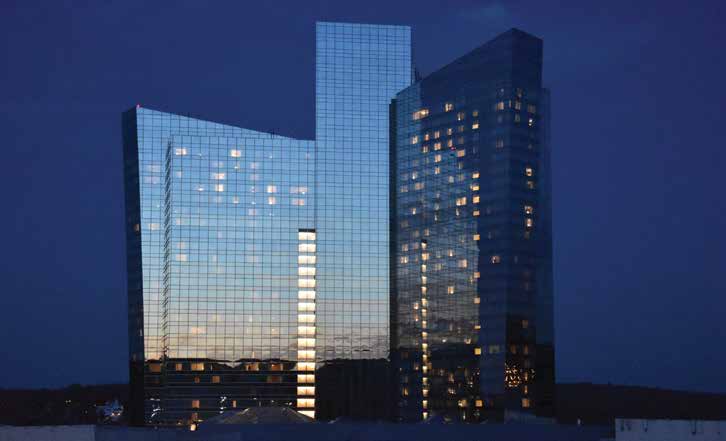
Despite both operating out of the third smallest state in the United States, Mohegan Sun and Foxwoods present an intriguing alternative to the large IR operators like Las Vegas Sands and MGM Resorts considered by many to be the leading contenders to win a Japan license, with their tribal Indian roots potentially providing the cultural sensitivity local lawmakers are looking for. Foxwoods, for example, boasts a US$200 million museum paying tribute to the history of the local Mashantucket Pequot Tribal Nation.
Not that Asia will be a completely new frontier, with Mohegan currently developing Project Inspire, an IR adjacent to South Korea’s international gateway Incheon airport with an annual throughput of more than 60 million passengers. Earlier this year, MGE “amicably” bought out its Korean partner, a chemical company, to take 100% control of the project, but declined to provide further details on the deal.
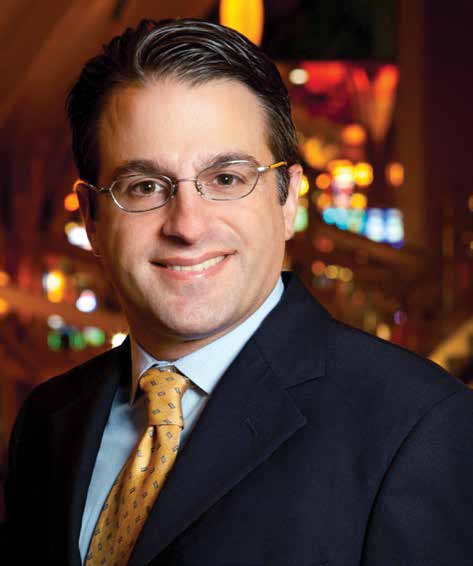
Inspire will be the “largest integrated resort in Northern Asia” Kontomerkos says, comprising an investment of US$5 billion over 20 years. Expected to open its US$1.6 billion first phase in 2021, Kontomerkos told the Tokyo gathering, “We will have the next influencer to drive visitors in Northern Asia,” with Korea’s largest indoor arena, its largest convention center, plus 1,000 hotel rooms and a 25,000-square meter (270,000 square foot) foreigneronly casino. Citing the millions of high-end travelers traversing
Incheon’s award-winning airport, he forecast, “We will have a large database of Northern Asian visitors” that would be potential customers for Japan.
On the sidelines of the Japan Gaming Congress, Kontomerkos and Foxwoods President and CEO Felix Rappaport sat down separately to discuss their respective prospects in Asia with Inside Asian Gaming.
Muhammad Cohen: Where do things stand with the Inspire integrated resort project at Korea’s Incheon International Airport?
Mario Kontomerkos: We are very advanced in the process. We’ve spent over US$15 million advancing with design and we are in the construction costing process for it. So you can see we are very committed to the process. We are at the point now where we feel very confident that by the end of the year, if not sooner, we will be breaking ground and starting construction in earnest in Incheon.
MC: How has the plan evolved since its original conception?
MK: We’ve learned a lot of things since we’ve come to Korea. I think one of the things we’ve learned is that the non-gaming aspects of our development can be as important, if not more important, than the gaming aspects. We’ve learned that Korean consumers are the highest consumers per capita of themed entertainment. We’ve learned that Korean consumers are probably the highest consumers per capita of movies as entertainment.
So the light has gone on regarding several different non-gaming developments. You are going to see us in the next few months aggressively trying to expand our non-gaming offerings in a way that I think will be very, very special.
MC: When you said highest consumers of movies, does that mean going to the theater to watch movies?
MK: Yes, per capita, folks in Korea are watching movies at a much higher rate than any other country. Not watching on their mobile or at home, but going out to watch the movies at theaters.
We are very excited about the entertainment aspects of Korea. And as we meet with folks in Korea, they are very focused on the entertainment aspects of our resort. I think that the real differentiator is in our arena, which will be a platform for worldwide content: Western content, Korean content, plus Asian content. It is truly going to be a very special place.
And then there’s other themed attractions on a large scale. I think we will be very, very well received there. We always wanted to make it the largest integrated resort in Northern Asia.
The property that we are building in Incheon will certainly be able to hold all these, because we’ve got 600 acres (243 hectares) there we are developing. It is essentially a US$5 billion investment over the next 20 years.
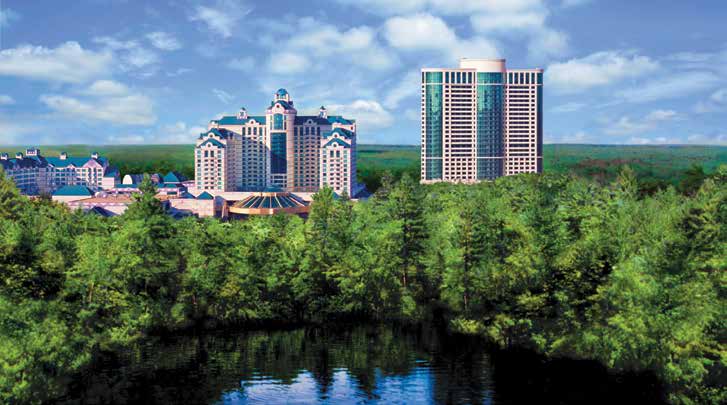
MC: Do you come there with any relevant experience with the Asian market?
MK: Yes, believe it or not. The Connecticut facility is the highestgrossing facility in the Western hemisphere. We don’t do the highest volume of Asian business, but we have the largest database of Asian business in the US, or we believe we have; it’s sort of a hard number to pin down. The number of Asian games that we offer is probably, if not the highest in the US, close to the highest.
We are very prolific in that area, so we have a dedicated area in Connecticut called Sunrise Square which is exclusively for Asian gaming and that is something we are replicating in other properties. So, yes, I think we have a lot of experience in this area.
MC: How much is the experience of Paradise City [a joint venture between South Korea’s top foreigner-only casino operator Paradise Group and Japanese gaming machine manufacturer Sega Sammy that opened in April last year at a different end of the Incheon airport complex] informing your project?
MK: Look, we believe very strongly in the concept of critical mass. We believe very strongly that one plus one is three. We’ve seen this example over and over in Asia, very successfully, and I’ve seen it in the United States being very successful as well. So we want to see Paradise succeed and we think that our development will be a different sort of experience but will be complementary. I think it will benefit both. The new Paradise product is very nice, very well appointed.
MC: What have you learned from them?
MK: What we are doing, like I said, is going to be different and complementary. We are going to be focused on different things. If you look at what they’ve done, they’ve done a nice job of creating this concept of an art theme. Ours will be more focused on entertainment, so I think we’ll be complementary and we will be very good for the whole Incheon region.
Our product is going to be a platform for South Korean and Western from a musical perspective, from a concert perspective, from F&B and retail perspectives. It’s really going to be a melding of both, which I think will be very successful.
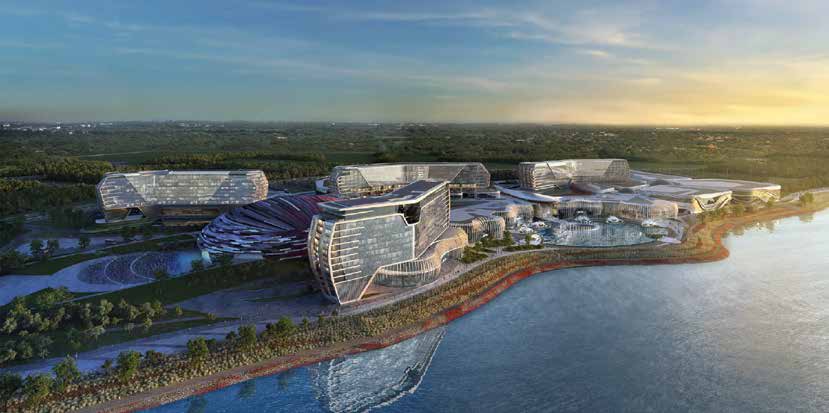
MC: We’re talking in Tokyo at the Japan Gaming Congress, where Mohegan Sun is a sponsor and you’re making a presentation. Beyond that, what’s Mohegan Sun’s current level of participation and interest in Japan?
MK: If we think of the fact that we are investing US$5 billion over the next 20 years at Incheon, at probably the busiest transit hub in all of Northern Asia, we believe that we are uniquely positioned to be able to benefit and connect both markets. So really we will be operating the largest integrated resort in Northern Asia when Inspire opens and we’ll be able to leverage that connection to the airport. The fact that we will have a database of millions of millions of foreigners who are mobile, affluent and willing to travel, can certainly be beneficial for the Japan IR process.
MC: What will you bring to the table in Northern Asia?
MK: You know, there’s a lot of benefits that we’ll bring. I think one thing is the fact that we are investing so much in this extremely high traffic corridor in Northern Asia. It’s going to be very unique – I think that’s number one.
Number two, I don’t think Korea has seen this scale of integrated resort and entertainment resort that we are looking to build before, so that’s going to be brand new for everybody in Korea and I think that’s going to knock people over. People are very excited about that.
Number three, I think it is very important to differentiate the fact that representing a tribe is very different from your average corporate brand. We as a tribe, our main goal is to ensure the sustainability and continuity of our constituents for not just one year, not just five years, but for 13 generations.
I think that our mindset is longer and a much longer-term mindset matches very well with the long-term planning that is evident here in Asia. Folks know that we are not here to eat and run. Folks know that we are here for a very, very long term and that we are going to be part of the fabric of the society in the exact same way that we are in the United States. That is a very, very big differentiating factor for us. So those are just a couple of reasons why.
MC: Hard Rock [owned by Florida’s Seminole tribe] said the same thing about thinking long term.
MK: Lots of tribes can make those type of statements, but only one tribe has got the Northern Asia exposure in the location that we do in Incheon.
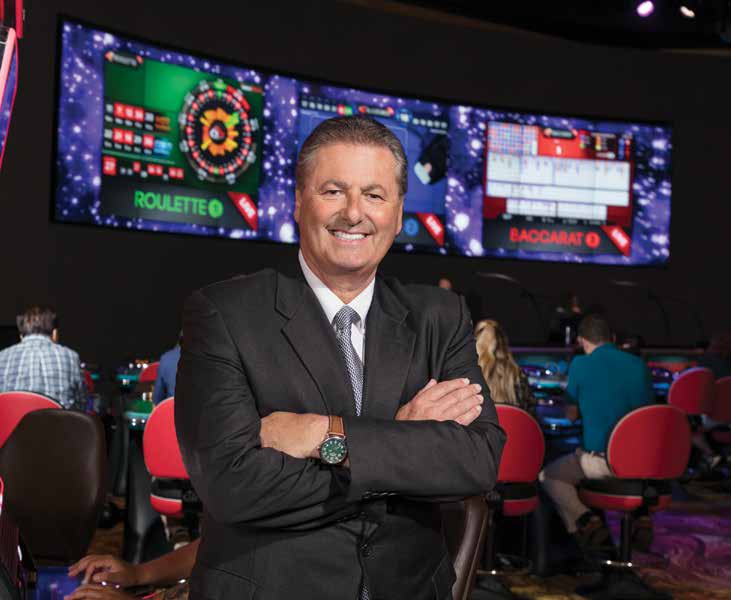
Ben Blaschke: We’re talking at the Japan Gaming Congress. What brings Foxwoods to Tokyo?
Felix Rappaport: Foxwoods is one of the largest IRs in North America. We were the third jurisdiction legally after Nevada and New Jersey, so it’s only natural for us after being in business for 26- plus years with 6.5 million people in our database that we explore to share our expertise and look at new markets to potentially brand a Foxwoods property.
We very actively look all across the United States and we are also willing to look globally. We think we bring certain advantages that perhaps other companies don’t have, not the least of which is experience. We think the combination of our brand, our database, our experience and the experience of our team makes us potentially a very good partner in Japan. But I would also say that our approach – we are all about win-win situations, unlike some companies that might come through a new jurisdiction and think that they don’t need help or don’t need partners. We are very culturally sensitive. We are the first full-service tribal gaming company and so we’re very respectful of culture and history.
We’re probably the only company here with its own museum. We have a 300,000-square foot, US$200 million museum dedicated to American tribal history and culture and when we have entertained Japanese visitors at Foxwoods there has been an amazing cultural connection in terms of veneration for the wisdom of elders and veneration for the land and the history of culture of our people. So we think we bring a lot of positives to the table.
BB: What has Foxwoods learned about Japan since exploring IR ?
FR: Japan is one of the most brilliant cultures in the world. The people are incredibly warm; I think the service culture is second to none. I have now been to Japan three times in the past year-anda- half and it’s always a phenomenal experience. You can’t walk anywhere in your hotel without being greeted incredibly warmly.
I think Japan in terms of culture and in terms of hospitality and potential is a magnificent country. We think it’s an extremely attractive country to look at possible developments.
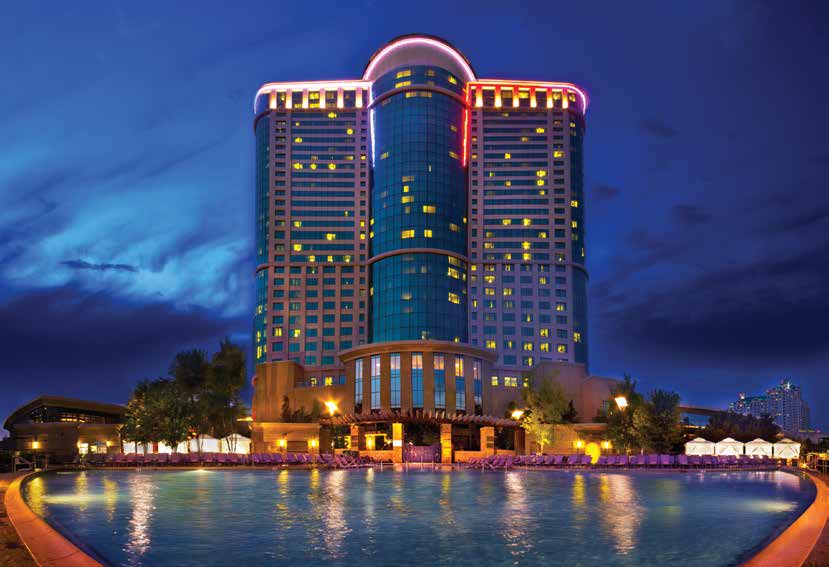
BB: Are you looking at a regional property rather than a major Japanese city?
FR: Well first of all, we know it is a very competitive environment and we also know our limitations. Are we the biggest gaming company in the world? Absolutely not. We have great respect for other companies in our industry. Obviously there is a level of competition but also a professional respect.
What I would say is that in the US there are two types of casinos. There are casinos that are destination casinos of which we are one and I think Foxwoods is probably the ideal example of an integrated resort because we are 9 million square meters under roof, we are 1,600 acres, we have 2,200 rooms and suites, 40+ restaurants, a 300,000-square foot mall, 100 stores, two theaters, 300 shows a year and 175,000 square feet of convention and meeting space.
Then of course there are casinos of convenience. They happen to be located near a population center on a highway. That’s typically not what we are – we try to give people more reasons to come to us, so I think any of the locations that are being discussed – Osaka, Yokohama, Tokyo, Nagasaki, Hokkaido – all have their own individual charm and appeal. But we certainly can’t help but notice that in some of the regional areas there is somewhat of an overlap in terms of what we’ve built in Connecticut and what some of the prefectures and communities are looking to build here.
We are a perfect example of a destination resort where people are willing to drive a little further or travel a little further because once they get there, there is a whole feast of things to do. You could easily spend a week at Foxwoods and never eat breakfast in the same place twice, never eat lunch in the same place twice, never have dinner in the same place, never go to the same nightclub or bar. I think we’re a really good model for that.
One of the things we’re really excited about is that we are creating a lot of attractions. We were just showing some colleagues our new zip line which goes from 350 feet off one of our towers, runs 3,800 feet and links to our museum, which is pretty unique. It’s three-quarters of a mile of zip line and you go 60 miles per hour. That is kind of the beginning of all these family-friendly activities we are adding in.
We’ve had 330 million people visit Foxwoods in the 25 years we’ve been open and that’s pretty phenomenal. Every year Las Vegas, with dozens of properties, gets around 44 million visitors. We have about 13 million a year just to Foxwoods and it takes some effort to get there, so we think we understand better than almost anyone in the business how to get people to drive 80 miles from Boston or 125 miles from New York because once they get there it’s not just gaming, it’s not a limited menu of things to do. It’s almost an unlimited menu of things to do.
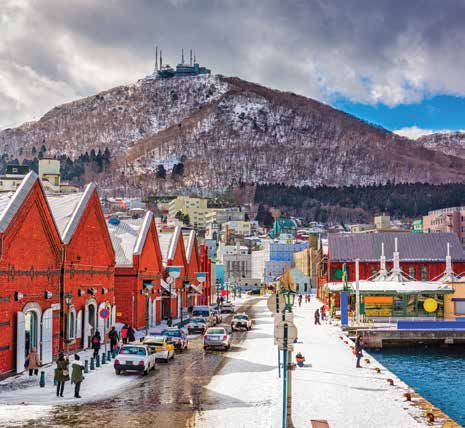
BB: What advantages can Foxwoods bring that bigger operators can’t?
FR: We have built-in cultural references at our property which makes us unique – yes we have a lot in common with Las Vegas properties but we also have a personality that makes us unique. Mashantucket Pequot Tribal Nation is a community and a government of 1,000- plus members and they’ve been in the area for hundreds and hundreds of years – long before the European settlers came – and they are very proud of their community.
They are very proud of what they’ve built but they also have great respect for other cultures so if I’m Japan, I’m making sure that, be it through museums or attractions, you build in all of that rich history and culture. The wonderful thing about Japan is that each region has its own rich history and each of the IRs that is built can have a reflection of what makes that particular region unique.
BB: What level of investment would you be looking at in Japan?
FR: We only know what people have told us. We have participated in the IR process in a couple of the jurisdictions and I think the number that we hear is more in the US$2 billion to US$3 billion range which is still a significant investment.
We estimate that to recreate Foxwoods in today’s dollars in the US is probably a US$2.5 billion to US$3 billion investment, so that’s probably not totally out of line. I think it really depends. We are all about partnerships. We are the ultimate in respectful partners so when we come to Japan or to a particular target area for an IR we want to partner with people. We want local companies and local investment partners to work with us as partners. They know the market better than we do. We know the business, we know the industry, we certainly know what works as an IR in the United States and our suspicion because of the global economy is that many of the things that work in Connecticut will also work here but it has to be tailored to the likes of both the Japanese people and the tourists we hope to attract.
I mentioned that we have attracted 330 million people since we opened – we are the number one tourist attraction in the state of Connecticut and I think it’s safe to assume that without our contribution and that of the other Indian tribe that runs a casino in Connecticut that tourism would be far less successful without our participation.
It’s also worth mentioning that Foxwoods has single-handedly contributed US$4 billion to the state fund through its participation in our revenue stream, so we project ourselves as being great community partners, we want to be an employer of choice and one of the top employers anywhere we go but I would think that working with local Japanese companies and local investment partners is really the key for us.
We don’t come in gangbusters and dictate to anybody what’s best. We want to learn, we want to absorb, we want to refine, we want to collaborate and approach everything in a collaborative fashion. It’s all about learning, respect, educating yourself and reflecting the tastes of the Japanese people and the potential tastes of the tourists to the country.






